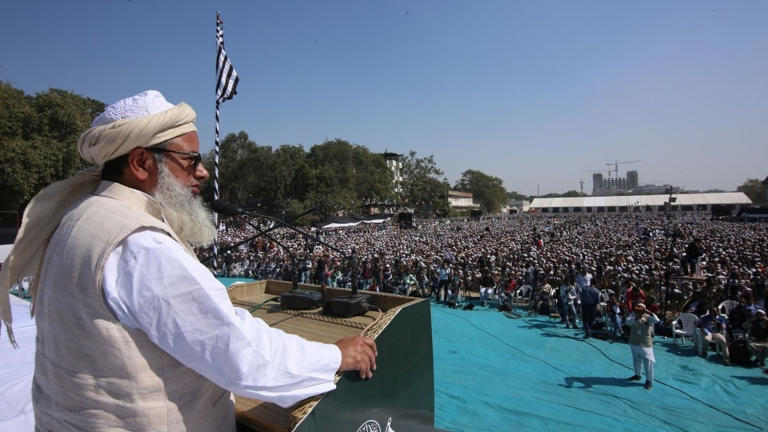Jamiat concerned over PM Modi’s expected participation in Ram Temple’s ceremony
The concerns expressed by the prominent Muslim organization, Jamiat Ulema-e-Hind, regarding Prime Minister Narendra Modi’s potential participation in the consecration ceremony at the Ram temple in Ayodhya reflect the sensitivities surrounding the intersection of religion and political leadership. The organization’s call for the Prime Minister to refrain from attending such events is rooted in the principle of maintaining secularism and upholding the constitutional mandate of religious neutrality in governance.
Given the historical significance of the Ram temple in Ayodhya and the deeply emotive nature of the issue, concerns have been raised regarding the potential implications of the Prime Minister’s participation in the consecration ceremony, particularly with regard to the perception of religious favoritism or bias.
The organization’s stance highlights the importance of maintaining a secular and inclusive political environment, wherein the government’s actions and policies uphold the principles of religious tolerance and communal harmony.
The invitation extended to Prime Minister Modi for the consecration ceremony underscores the symbolic significance of the event for many within the Hindu community. However, the concerns raised by Jamiat Ulema-e-Hind reflect the need for political leaders to prioritize the principles of inclusivity and secular governance, ensuring that their actions and engagements do not promote the perception of religious partisanship or exclusion.
Overall, the organization’s expression of concern serves as a reminder of the delicate balance that political leaders must maintain when engaging with religiously significant events, emphasizing the need for political leadership to foster an environment of religious harmony and tolerance while upholding the principles of secularism and constitutional values.
The statement from Jamiat Ulema-e-Hind’s chief, Maulana Mahmood Madani, expressing concern over Prime Minister Modi’s anticipated participation in the forthcoming ceremony at the Ram Temple in Ayodhya reflects the ongoing dialogue surrounding the intersection of religious sentiment and political representation. Madani’s concerns echo the organization’s commitment to upholding the principles of religious inclusivity and secular governance, emphasizing the need for political leaders to maintain a non-partisan stance on religious matters.
Given the historical and emotional significance of the Ram Temple’s consecration ceremony, concerns have been raised about the potential implications of the Prime Minister’s attendance, particularly regarding the perception of political leaders aligning with specific religious sentiments or causes. Madani’s statement underscores the organization’s emphasis on fostering communal harmony and unity, urging political leaders to prioritize the principles of religious tolerance and secular governance in their actions and engagements.
While acknowledging the personal sentiments of the Prime Minister, the concerns expressed by the Jamiat Ulema-e-Hind’s chief reflect the organization’s broader commitment to advocating for an inclusive and equitable social and political environment. The organization’s stance serves as a reminder of the importance of upholding the values of religious coexistence and respecting the diverse religious beliefs and sentiments of all communities.
Overall, the statement by Maulana Mahmood Madani highlights the need for political leaders to navigate religiously significant events with sensitivity and prudence, ensuring that their actions and engagements contribute to fostering an environment of communal harmony and unity, while upholding the principles of religious pluralism and secular governance.
The reiterated stance of the Jamiat Ulema-e-Hind’s chief, Maulana Mahmood Madani, advocating for the separation of political and religious spheres underscores the organization’s commitment to upholding the principles of secular governance and religious autonomy.
Madani’s emphasis on the need for the Prime Minister to refrain from participating in ceremonies of any religious structure reflects the organization’s dedication to promoting a political environment that respects the diverse religious beliefs and practices of all communities, while safeguarding the principles of religious freedom and autonomy.
By stressing the importance of maintaining a distinction between political participation and religious observances, Madani reiterates the organization’s commitment to preserving the sanctity and integrity of religious rituals, emphasizing that these practices should be conducted and attended by religious leaders and practitioners without any political influence or intervention.
Additionally, the Jamiat Ulema-e-Hind’s chief’s reaffirmation of the organization’s view on the Supreme Court’s verdict on the Ayodhya dispute as “generally flawed” underscores the organization’s ongoing reservations about the legal proceedings and outcomes of the highly contested case. This perspective reflects the organization’s continued advocacy for a fair and just resolution that upholds the principles of religious harmony and inclusivity, while addressing the historical and emotional significance of the Ayodhya dispute.
Overall, Maulana Mahmood Madani’s reiterated positions highlight the Jamiat Ulema-e-Hind’s steadfast commitment to upholding the values of religious freedom, secular governance, and communal harmony, emphasizing the need for political leaders to maintain a respectful distance from religious affairs and rituals to preserve the integrity and sanctity of religious practices.
Maulana Mahmood Madani’s acknowledgment of the appeal from certain Muslim leaders urging the Prime Minister’s attendance at the foundation-laying ceremony of a mosque near Ayodhya reflects the complexities and sensitivities surrounding religious and political dynamics in the region.
Madani’s highlighting of this appeal in contrast to the organization’s official position emphasizes the importance of maintaining a unified and consistent stance within the Jamiat Ulema-e-Hind, underscoring the organization’s commitment to upholding its core principles and values.
Madani’s caution to all officials associated with the Jamiat at every level to refrain from making any statements that deviate from the organization’s official position signifies the importance of maintaining organizational discipline and unity in the face of differing viewpoints.
This directive aims to ensure that the organization’s messaging remains coherent and aligned with its established stance on significant religious and political matters, promoting a unified approach to advocacy and representation within the organization.
The statement from Madani reflects the challenges faced by religious organizations in navigating complex and often sensitive political landscapes, highlighting the need for a balanced and principled approach to addressing the diverse perspectives and demands within the community.
Madani’s emphasis on maintaining a unified organizational stance underscores the importance of fostering cohesion and consistency within the Jamiat Ulema-e-Hind, reinforcing the organization’s commitment to advocating for religious harmony, secular governance, and the preservation of communal unity.

